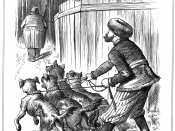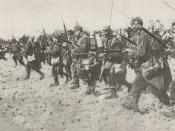NOTE: This was an answer to a SHORT-ESSAY Question, confined to 500 words.
Question: (Summarized) During the Reforms of the Imperial Army (RUSSIAN) in 1870s, do you agree or disagree with the viewpoint of the Military Academy Elite that "The bullet's a fool, the bayonet's a fine lad."
Answer:
I highly disagree with the statement "The bullet's a fool, the bayonet's a fine lad." As the emergence of modern warfare was in full bloom, the reliance upon the most elementary weapon in history was not only an absurdity in theory, but was a realized nightmare in practice throughout Russian tactics from pre-Russo-Turkish War until almost eve of World War I. The regulations covering infantry tactics (and as the centerpiece of the war machine, all other combat arms) was so geared to the ultimate struggle in will and morals that the effectiveness of direct fire was completely ignored. Expounding the problem was the reliance upon the victorious outcome of the much outdated "cold steel" approach.
Formations were still regulated as either open or closed; however, the open was utilized more for the approach (to lessen the casualties accrued from enemy artillery) and upon gaining contact with the enemy force, the closed formation was assumed. At this point, backed by the very ineffectual skirmish company rifle-support, the literal "running of the blades" began as the Russian infantry sprinted in a somewhat-controlled fury to decimate their foe with the bayonet charge. In short, the Russian infantry regulation called for one, possibly two controlled volleys, purposely discredited the effectiveness of individual (and therefore, aimed) fire, and demanded strict adherence to the importance of an uninterrupted, ferocious bayonet charge--thereby assuring both the charge's success, the battle's success, and ultimately, securing the ever present cult of the bayonet.
Unfortunately, the Russo-Turkish War helped to strengthen...



Negative...........
Ok, here we go again:
If you are going to take the easy route of "Sad Face / Happy Face" click, then please leave some kind of comment for either me (to work on possible problems in style or content) or to the masses (as to why you did not like the paper.
Note to Kraft: When will this be MANDATORY?! :)
11 out of 14 people found this comment useful.